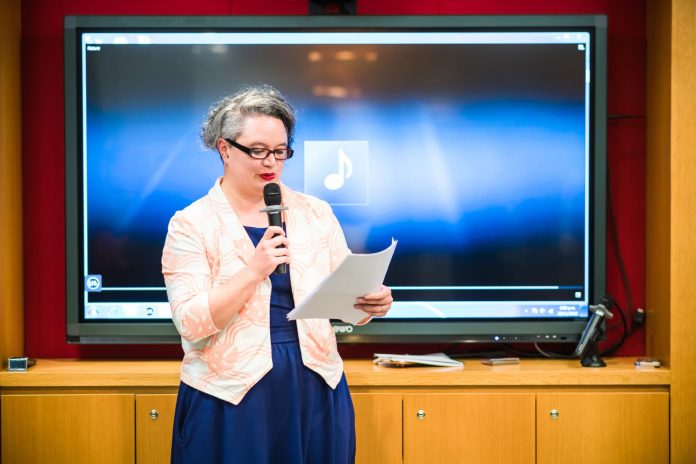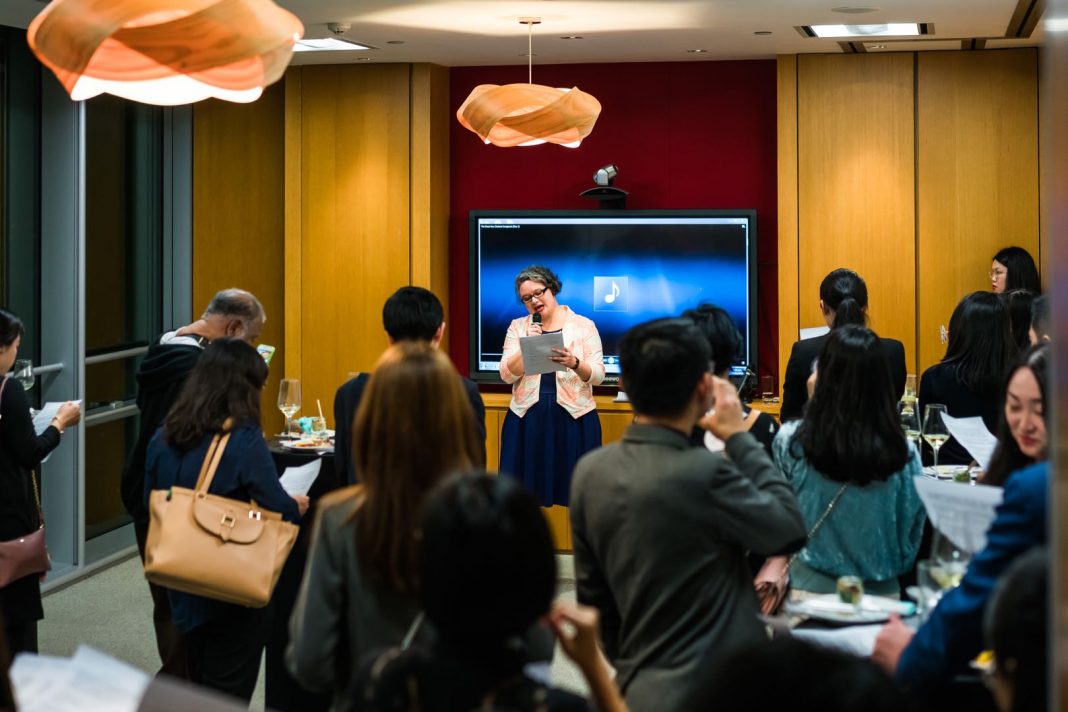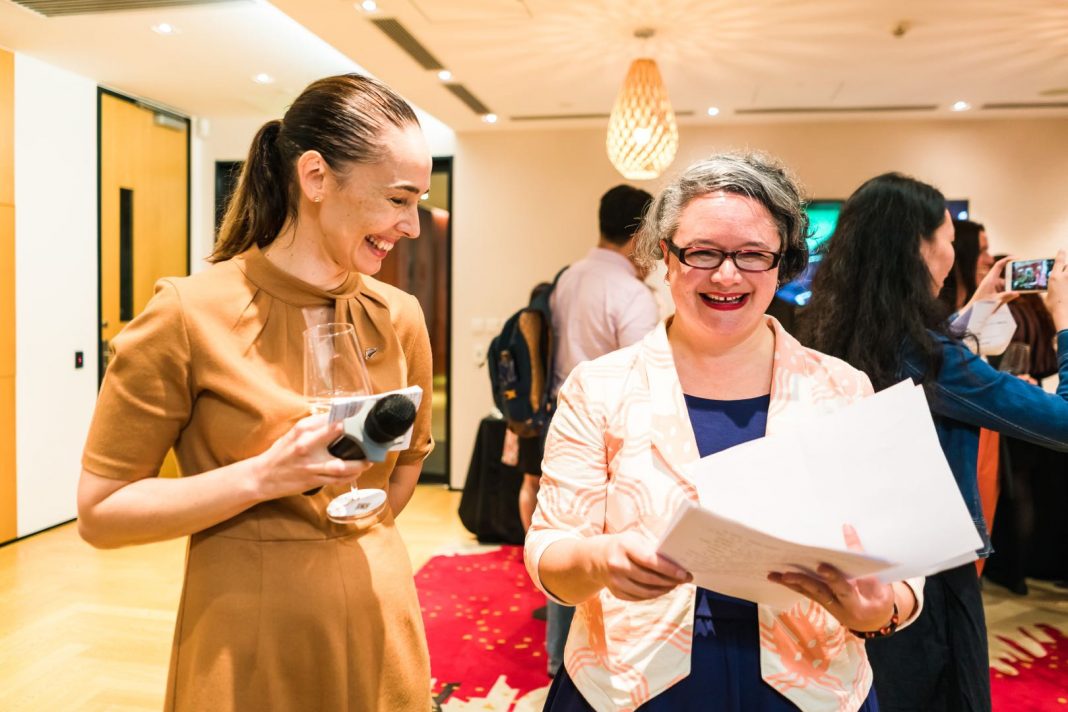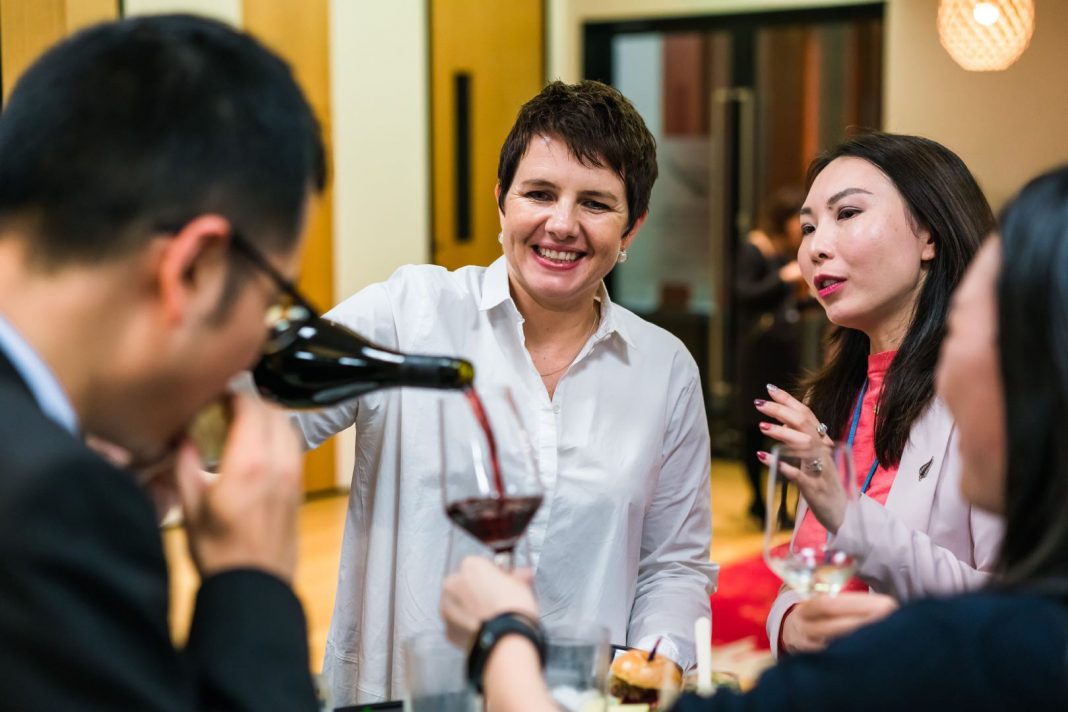
Delta Bridges: 我们知道您同时拥有法律和英语文学的学位,您觉得法律学习在您的文学道路上发挥了什么作用?
We know that you have a law and English lit degree, so how do you think the law study has contributed to your writing career?
我觉得作用特别大。学习法律其实就是学习叙事、说服以及对语言的热爱,而这些技能都对我写作有帮助。而且这也让我养成了严格遵守时间的习惯。对于一个作家来说,有时间观念才可以按时交稿,才有可能做自由撰稿人的同时,还能应付其他工作。我其实并没有真正做什么法律相关的工作,但是我一直得益于我通过学法所得来的技巧。法律学习很讲究用词,比如为什么要用这个词而不是那个词。这其实也有点像翻译。这意味着,当我看着我自己写的作品,我会很关注用正确的词语和句子去传达我的意思,也给了我以前从不曾想过的,不同的视角,还让我能在表达方面更精确,更清晰。
I think it contributed a lot. Law is all about storytelling, persuasion and a love of language. All of those skills helped with my writing. And it made me a discipline student to make deadline. To be able to make deadlines for a writer means I can get project done and means I can be freelance for other people and be able to get jobs. I hadn’t practiced the law, but I practiced that by using the skills. A lot of focus on law is around words – why certain words are over the other. It is a little bit like interpretation. That means, when I look at my work, I can concentrate in using the right word and sentences to convey the meaning. It gives me a perception I didn’t think I would have. It also trained me to be specific and be clear about things.

DB: 您最初主要写剧本,是什么让您开始写小说呢?
You started by writing plays. What inspired you to write novels?
虽然我一开始是写剧本的,但我一直都特别热爱小说。我凭我写的剧本参加了一个比赛,并且获奖了,之后有人问我:“你有小说吗?”我说没有。后来这个问题就一直在我头脑中萦绕。后来我就想:“我为什么不能有小说呢?”所以最初这并不在我的计划当中,但是现在我非常高兴我挑战了自己。我喜欢这两种文学形式,但是转型并不容易。因为在戏剧里,很多东西你可以留白,让读者演员去发挥想象,但是小说不同。所以我花了很长时间去探索小说的写作。对我来说,这是一个学习的过程。这也给了我不一样的视角。所以现在是有点偏剧作家的小说家,也是偏小说家的剧作家。有时候有的读者说我的小说很有剧场感,人物动作非常清晰。我想这是因为我有剧作背景。而且我的剧作语言也会受我小说的影响。我在两者之间寻找平衡点。
It has been my passion. I started as a playwright. I entered competition with my script and won the category for it. After that, I was asked, “do you have a novel?” I said no. but this question kept haunting my mind. Eventually I thought, “well, I could.” So originally it was not my plan at all, but I am so glad that i took the challenge. I love both in different ways. It’s absolutely not easy to change. Because in the play you leave it quite blank, so you can cast the character. It took me a long time to explore how novel writing works. It’s a learning process for me. It gives me a different angle. So I think I am a bit playwright for being a novelist and a bit novelist for being a playwright. So sometimes people say that my novel is quite cinematic, or they can see the action quite clearly. I think that comes from my playwriting background. And also, my plays’ language kind of comes from fictions. They fit into each other.
我的第一本小说花了四年的时间,一部分是因为我需要去学习小说写作,我也很感激出版社非常支持我,让我有更多的时间去打磨初稿。
It took me 4 years to write the first novel, partly because I was trying to figure out how to write a novel. I was lucky that the publish house was supportive so I have some more experience to First and second draft.
DB: 您毛利人的身份对您在写作风格、选材上有什么影响呢?
Does your identity as Māori influence what you write (writing style, content, etc.)?
确实有影响。我跟一些新型的作家也有谈论这个问题。有时候他们会担心,他们会不会过于受毛利身份的影响。但对我来说,我以毛利人的身份去写作,是因为毛利人有很独特的世界观,而我可以把这种世界观融入到写作中。比如说,我写小说我时经常会运用毛利的款客之道,就是对客人负责,让他们感到舒服。你们相处感到舒服,双方才有可能进行真正的对话。当然,这个待客之道也与客人相关,就是客人要尊重主人。我一直在我小说当中贯彻这个概念。我想确保我的读者能读懂整个故事,我不希望哪一些很高大上的东西去为难他们,让他们觉得索然无味。这个想法就来自于我毛利人的身份。
I think it does. I talked to the emerging writers about this. Sometimes they are worried that they’ve been working as Māori enough. For me I work as Māori because we have a unique perspective on the world and we bring those ideas to the work. So, for instance, my novel writing likes to think about the concept of manaakitanga, which is hospitality. So, it’s about being responsible for your guests and making sure they are comfortable. You can have a real talk with each other because you feel comfortable. The concept of hospitality is also about guests. Guests have the responsibility to be respectful to the hosts. I am trying to apply the concept to my novels. In this way, I try to make sure the readers know what’s going on. I don’t want to trick them by doing fancy things, so they don’t understand what’s going on. I try to entertain them. This kind of idea comes from my identity of Maori.

DB: 您的小说,不论是《The Graphologist’s Apprentice》,《Bugs》还是《Legacy》,都定位为青少年小说。您有希望在文字中向年轻一代表达什么吗?
Your novels, The Graphologist’s Apprentice, Bugs and Legacy, are writing for young adults. Are you trying to convey any messages to the new generation?
《Legacy》可能不算是青少年小说。它的形式实际上是给成年人的。我想写那些总是自找麻烦,但是又能顺利度过难关的角色。而我觉得,青少年角色非常符合我想写的这种类型。我甚至都没想过要我的目标读者是青少年,我只是单纯对这样一种类型的角色很感兴趣。但是在《Legacy》,我希望传达给年轻人的信息比其他两本要多。因为这是关于一个年轻人无意间回到了他祖辈的时代,跟他的曾曾祖父生活在一起。
Possibly not so in Legacy. The form is actually for adult. I want to write about the characters that get themselves into trouble and get themselves out of trouble. And for me, teenage characters fit that sort of idea the best. I wasn’t even thinking about being for young people. I was just purely interested in that character. So for Legacy, my latest novel, I have more messages for young people than the others. Because it’s about a young man goes back in time by accidence and lives with his great great grandfather. And I want the young people to look at their own history and their family involvement history.
在新西兰,我们都是从白人的视角去看第一次世界大战,所以最初看到毛利人实际也参与了一战,我是非常惊讶的。我听过他们有参与二战,但是我对他们在一战的历史一无所知。我觉得这在今天显得非常重要。如果我们要纪念或铭记一战,我们需要一个完整的故事。而且发现一些关于这个国家还没有关注的信息非常重要,我希望年轻人可以去关注他们的历史和家族的故事,也希望未来会有更多关于毛利人在一战的故事。
In NZ we know a lot about the WWI from the pakeha (European New Zealander) perspective. I was surprised that Māori had involved in WWI. I heard them they were involved in WWII but I didn’t know their stories during WWI. I thought it was really important today. If I am going to celebrate or commemorate that WWI is the full story that we had for. It’s really interesting to find out something I didn’t know about the country and it’s very important to people. And there are more narratives around of Māori about what they did in WWI.

DB: 您在出访中国期间,出席了中山大学的写作营,也在广州联合书店做了公开讲座。您觉得中国人对新西兰文学的了解程度怎么样呢?
During your time in China, you attended the Creative Writing Program in Sun Yat-sen University and also gave a public lecture in UN Bookshop. What do you think the Chinese people’s awareness of New Zealand literature in China?
其实我没有期待太多,因为新西兰是个小国家,中国很大。但是我特别惊喜,尤其是在和中山大学的学生交流的时候。当我提到一些新西兰作家的时候,他们知道他们是谁。相反我感觉的特别不好意思,因为我对中国现代文学知之甚少,基本上只了解一些中国古代的神话还有哲学。这次来中国激发了我学习中国现代文学作品的热情。希望回国之后,我能多看中国文学作品。
I wasn’t expecting a lot. Because New Zealand is a small country and China is big. But I was really surprised, particularly when talking to the students of Sun Yat-sen University. When I said some New Zealand writers, they knew who they were. I feel really shame because I know little about contemporary Chinese literature. So, the only kind of Chinese literature I know are the ancient myths or the old philosophy. Coming here has inspired me to look for more contemporary works. Hopefully when I go back home, I can get some Chinese works and immerse myself into it.
DB: 您可以跟我们分享一下您现阶段在阅读的一些有趣的书目吗?
Can you share with us the list of the interesting books you are reading at the moment?
我经常都会分享我的书单给大家,因为一般书籍都非常类型丰富。但是现在由于我在做短篇故事的项目,所以大部分在读的书都是短篇小说。我很荣幸可以参与这个项目,通过这个项目,我看到很多很有才的毛利作家对毛利神话做的现代改编。这段时间,也阅读了很多关于毛利的神话、科幻、反乌托邦式的各种作品。其中一部作品我今晚也会分享,叫做《Moving Mountains》,这是个发生在新西兰中部一个小岛上的故事。我今晚也会先做一些背景介绍。
I always have to share a list of books I am reading at the moment because it’s always quite variable. But at the moment, because I am working on a collection of short stories. Most books I am reading are people’s submission to their collections. So, I am very privileged to work on this project. We’ve contacted so many different talented Māori writers to rewrite Māori myths and the contemporary setting. So I’ve been reading old myths, sci-fi, dystopia, and myths about the place of Māori. One of the things I am reading tonight is called Moving Mountains. That’s based on a myth in central island of New Zealand. I’ll also do some background reading.
DB: 新西兰的葡萄酒旅游业广受欢迎,您可以跟我们分享一些品酒的小知识吗?
New Zealand is very popular for wine tasting travel. Can you tell us some of your tips on wine tasting?
我的建议应该就是别喝太多吧,保持清醒(笑)。但是要多尝试不同的酒,学会去品鉴。品酒品的不是量,而是享受滴滴香醇。这是一个社交活动,而不是斗酒。享受今晚是我最大的建议。
Probably don’t drink too much and try to keep hydrated. Try as much as you can and really appreciate it. It’s not about drinking as much as you can, but to enjoy the flavor. It’s a social event, but not about getting drunk. Enjoy the wine. That’s probably my biggest tip.





